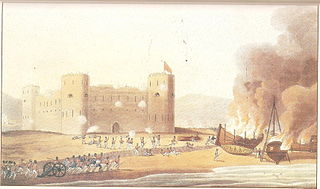 W
WBolívar's campaign to liberate New Granada of 1819-1820 was part of the Colombian and Venezuelan wars of independence and was one of the many military campaigns fought by Simón Bolívar. Bolívar's victory in New Granada secured the eventual independence of northern South America. It provided Bolívar with the economic and human resources to complete his victory over the Spanish in Venezuela and Colombia. Bolívar's attack on New Granada is considered one of the most daring in military history, compared by contemporaries and some historians to Napoleon's crossing of the Alps in 1800 and José San Martín's Crossing of the Andes in 1817.
 W
WThe Bolivian war of independence began in 1809 with the establishment of government juntas in Sucre and La Paz, after the Chuquisaca Revolution and La Paz revolution. These Juntas were defeated shortly after, and the cities fell again under Spanish control. The May Revolution of 1810 ousted the viceroy in Buenos Aires, which established its own junta. Buenos Aires sent three military campaigns to the Charcas, headed by Juan José Castelli, Manuel Belgrano and José Rondeau, but the royalists ultimately prevailed over each one. However, the conflict grew into a guerrilla war, the War of the Republiquetas, preventing the royalists from strengthening their presence. After Simón Bolívar and Antonio José de Sucre defeated the royalists in northern South America, Sucre led a campaign that was to defeat the royalists in Charcas for good when the last royalist general, Pedro Antonio Olañeta, suffered death and defeat at the hands of his own defected forces at the battle of Tumusla. Bolivian independence was proclaimed on August 6 of 1825.
 W
WThe Battle of Boyacá (1819), was the decisive battle that ensured the success of Bolívar's campaign to liberate New Granada. The battle of Boyaca is considered the beginning of the independence of the North of South America, and is considered important because it led to the victories of the battle of Carabobo in Venezuela, Pichincha in Ecuador, and Junín and Ayacucho in Peru.
 W
WThe Battle of Grahamstown took place on 22 April 1819, during the 5th Xhosa War, at the frontier settlement of Grahamstown in what is now the Eastern Cape province of South Africa. The confrontation involved the defence of the town by the British garrison, aided by a group of Khoikhoi marksmen, from an attack by a large force of attacking Xhosa warriors.
 W
WThe Battle of Las Queseras del Medio was an important battle of the Venezuelan War of Independence. It took place on April 2, 1819. The forces of José Antonio Páez consisted of 153 lancers, who were llaneros. They were pitted against more than 1,000 Spanish cavalry. The battle is noted for a phrase of Páez's that became famous: ¡Vuelvan Caras! –although some sources state that he actually said ¡Vuelvan, Carajo! .).
 W
WThe Long Expedition was an 1819 attempt to take control of Spanish Texas by filibusters. It was led by James Long and successfully established a small independent government, known as the Republic of Texas. The expedition crumbled later in the year, as Spanish troops drove the invaders out. Long returned to Texas in 1820 and attempted to reestablish his control. In October 1821, Long was defeated by Spanish troops, captured and sent to Mexico City where he was killed by a guard.
 W
WThe Persian Gulf campaign of 1819 was a British punitive expedition, principally against the Arab maritime force of the Al Qasimi in the Persian Gulf, which embarked from Bombay, India in November 1819 to attack Ras Al Khaimah. The campaign was militarily successful for the British and led to the signing of the General Maritime Treaty of 1820 between the British and the Sheikhs of what was then known as the 'Pirate Coast', would become known as the 'Trucial Coast' after this treaty and the territory that today comprises the United Arab Emirates.
 W
WThe Peterloo Massacre took place at St Peter's Field, Manchester, Lancashire, England on Monday 16 August 1819. On this day, cavalry charged into a crowd of around 60,000 people who had gathered to demand the reform of parliamentary representation.